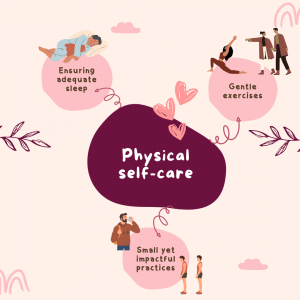
Introduction
As Valentine’s Day approaches, let’s shift the spotlight from external gestures to the heart’s most intimate connection – the one with oneself. This article guides you on a self-love journey, exploring mindful practices, fostering a healthy relationship with food, embracing mental well-being through gratitude, and acknowledging the vital role of physical self-care. Join us in celebrating a Valentine’s Day that goes beyond conventional expressions, focusing on the love that begins within, a love that encompasses mind, body, and soul.
i.Mindful Self-Care Practices


Engage in mindful practices such as meditation, journaling, or serene nature walks to nourish your soul. These activities contribute not just to mental clarity but also to an overall sense of well-being. As you carve out time for these practices, you’re giving yourself the care and attention that lays the foundation for self-love. According to a study published in the Journal of Clinical Psychology, incorporating mindfulness practices has been linked to reduced stress levels and improved mental health. By taking a little time for yourself, you are not only nurturing self-love but also building resilience against life’s challenges.
ii. Healthy Relationship with Food

Foster a positive relationship with food by savoring a special, healthy meal. Indulge without guilt, relishing every bite mindfully. This Valentine’s Day, let’s celebrate this trend and indulge in a treat that not only delights our taste buds but also nourishes our bodies. It is a special occasion, and while we encourage this celebration, let’s remember the importance of maintaining a balanced and wholesome approach to eating, promoting habits that contribute to our overall health.
iii. Mental Self-Care
Gratitude is a powerful tool in cultivating mental well-being. Incorporate gratitude practices into your daily life, taking a moment to reflect on the aspects of yourself that you appreciate. According to a study in the Journal of Personality and Social Psychology, this simple yet profound act has been linked to improved mental health, life satisfaction and self-esteem, serving as a reminder of the strength and resilience within you. It is also a reminder of the social support we have that we can rely on rainy days.
Iv. Physical Self-Care:
Acknowledging the importance of physical self-care is universal. This Valentine’s Day, let’s take a moment to consider our physical well-being. Incorporating gentle exercise, ensuring adequate sleep, and adopting small yet impactful practices contribute to our overall health.

Incorporating gentle exercise:
Physical activity is not just a means to maintain a certain physique; it’s a crucial component of overall health. According to the World Health Organization, physical inactivity is the fourth leading risk factor for global mortality, contributing to conditions such as heart disease, diabetes, and certain cancers. This Valentine’s Day, consider incorporating gentle exercises into your routine. It could be as simple as a leisurely stroll in the park, a calming yoga session, or a dance class. These activities not only promote physical fitness but also release endorphins, the body’s natural mood elevators, fostering a sense of well-being.
Ensuring adequate sleep:
In our fast-paced lives, sleep often takes a back seat. However, its impact on our physical and mental health cannot be overstated. The National Sleep Foundation recommends adults aim for 7-9 hours of sleep per night. However, it’s essential to recognize that sleep needs vary from person to person. If you find yourself consistently feeling rested and refreshed with fewer hours of sleep, that may be sufficient for you. On the other hand, if you often wake up feeling tired and struggle to stay alert during the day, it may be a sign that you need more sleep. Adequate sleep is linked to improved immune function, mental clarity, and overall resilience. This Valentine’s Day, consider giving yourself the invaluable present of a good night’s sleep. Create a peaceful bedtime routine, limit screen time before bed, and ensure your sleep environment is conducive to rest.
Adopting small yet impactful practices:
Physical self-care isn’t just about grand gestures; small, consistent practices can make a significant difference. Take breaks during the day to stretch and move, especially if you have a sedentary job. Do gentle neck stretches by slowly tilting your head from side to side or gently rolling your shoulders to relieve tension and promote relaxation. Besides that, stay hydrated, as water is essential for numerous bodily functions, including digestion and temperature regulation. Practice good posture to prevent unnecessary strain on your muscles and joints. These seemingly minor actions, when woven into your daily routine, contribute to a healthier, more vibrant you.
Conclusion
By caring for our bodies, we’re not merely reinforcing a superficial love; we’re taking a proactive step towards a healthier and more resilient self. This Valentine’s Day, let the celebration extend beyond chocolates and flowers to a commitment— a commitment to cherish and prioritize the vessel that carries us through life. In acknowledging the importance of physical self-care, we not only enhance our immediate well-being but also lay the groundwork for a future filled with vitality and resilience.
Jonathan, Dietetics Intern
References
- Keng SL, Smoski MJ, Robins CJ. Effects of mindfulness on psychological health: a review of empirical studies. Clin Psychol Rev. 2011 Aug;31(6):1041-56. doi: 10.1016/j.cpr.2011.04.006. Epub 2011 May 13. Retrieved from: https://www.ncbi.nlm.nih.gov/pmc/articles/PMC3679190/
- Kerry N, Chhabra R, Clifton JDW. Being Thankful for What You Have: A Systematic Review of Evidence for the Effect of Gratitude on Life Satisfaction. Psychol Res Behav Manag. 2023 Nov 28;16:4799-4816. doi: 10.2147/PRBM.S372 432. Retrieved from:https://www.ncbi.nlm.nih.gov/pmc/articles/PMC10693196/
- Paruthi, S., Brooks, L. J., D’Ambrosio, C., Hall, W. A., Kotagal, S., Lloyd, R. M., Malow et al.2016. Consensus statement of the American Academy of Sleep Medicine on the recommended amount of sleep for healthy children: Methodology and discussion. Journal of Clinical Sleep Medicine, 12(11), 1549–1561. Retrieved from: https://pubmed.ncbi.nlm.nih.gov/27707447/
- Physical inactivity. World Health Organisation (WHO). Retrieved from: https://www.who.int/data/gho/indicator-metadata-registry/imr-details/3416
- Storyset. Retrieved from: https://www.freepik.com/free-vector/spring-concept-illustration_37573702.htm#position=1
- Storyset. Retrieved from: https://www.freepik.com/free-vector/diary-concept-illustration_11140488.htm#position=3














